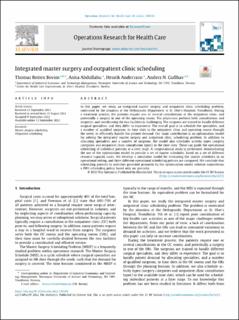| dc.contributor.author | Bovim, Thomas | |
| dc.contributor.author | Abdullahu, Anita | |
| dc.contributor.author | Andersson, Henrik | |
| dc.contributor.author | Gullhav, Anders Nordby | |
| dc.date.accessioned | 2023-02-15T08:22:03Z | |
| dc.date.available | 2023-02-15T08:22:03Z | |
| dc.date.created | 2022-10-24T14:45:07Z | |
| dc.date.issued | 2022 | |
| dc.identifier.citation | Operations Research for Health Care. 2022, 35 . | en_US |
| dc.identifier.issn | 2211-6923 | |
| dc.identifier.uri | https://hdl.handle.net/11250/3050909 | |
| dc.description.abstract | In this paper, we study an integrated master surgery and outpatient clinic scheduling problem, motivated by the situation at the Orthopaedic Department at St. Olav’s Hospital, Trondheim. During a treatment process, the patients require one or several consultations at the outpatient clinic, and potentially a surgery in one of the operating rooms. The physicians perform both consultations and surgeries, and coordinating the two facilities is challenging. The surgeons are trained to handle different surgical specialties, and they differ in experience. The overall goal is to schedule the specialties, and a number of qualified surgeons, to time slots in the outpatient clinic and operating rooms through the week, to efficiently handle the patient demand. Our main contribution is an optimisation model for solving the integrated master surgery and outpatient clinic scheduling problem. In addition to allocating specialties and a number of surgeons, the model also schedules activity types (surgery categories and outpatient clinic consultation types) to the time slots. These can guide the operational scheduling of individual patients at a later stage. A computational study is performed, demonstrating the use of the optimisation model to provide a set of master schedules, based on a set of different resource capacity cases. We develop a simulation model for evaluating the master schedules in an operational setting, and three different operational scheduling policies are compared. We conclude that scheduling patients to activities governed primarily by the optimisation model solution outperforms a FIFO scheduling policy based only on specialty. | en_US |
| dc.language.iso | eng | en_US |
| dc.publisher | Elsevier | en_US |
| dc.rights | Navngivelse 4.0 Internasjonal | * |
| dc.rights.uri | http://creativecommons.org/licenses/by/4.0/deed.no | * |
| dc.title | Integrated master surgery and outpatient clinic scheduling | en_US |
| dc.title.alternative | Integrated master surgery and outpatient clinic scheduling | en_US |
| dc.type | Peer reviewed | en_US |
| dc.type | Journal article | en_US |
| dc.description.version | publishedVersion | en_US |
| dc.source.pagenumber | 17 | en_US |
| dc.source.volume | 35 | en_US |
| dc.source.journal | Operations Research for Health Care | en_US |
| dc.identifier.doi | 10.1016/j.orhc.2022.100358 | |
| dc.identifier.cristin | 2064530 | |
| cristin.ispublished | true | |
| cristin.fulltext | original | |
| cristin.qualitycode | 1 | |

